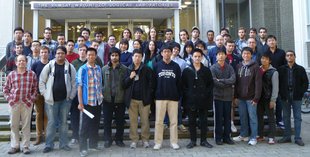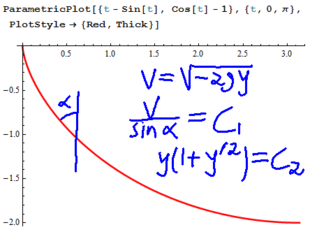12-267/About This Class
| ||||||||||||||||||||||||||||||||||||||||||||||||||||||||||||
Crucial Information
Agenda: If calculus is about change, differential equations are the equations governing change. We'll learn much about these, and nothing's more important!
Instructor: Dror Bar-Natan, drorbn@math.toronto.edu, Bahen 6178, 416-946-5438. Office hours: by appointment.
Classes: Mondays, Tuesdays, and Fridays 9-10 in RW 229.
| Teaching Assistant: Jordan Bell, jordan.bell@utoronto.ca.
Tutorials: Tuesdays 10-11 at RW 229. No tutorials on the first week of classes. |
URL: https://drorbn.net/drorbn/index.php?title=12-267.
Abstract
Taken from the Faculty of Arts and Science Calendar:
First-order equations. Linear equations and first-order systems. Non-linear first-order systems. Existence and uniqueness theorems for the Cauchy problem. Method of power series. Elementary qualitative theory; stability, phase plane, stationary points. Examples of applications in mechanics, physics, chemistry, biology and economics.
- Prerequisite: MAT157Y1, MAT247H1.
- Corequisite: MAT257Y1.
- Exclusion: MAT244H1.
- Distribution Requirement Status: This is a Science course.
- Breadth Requirement: The Physical and Mathematical Universes (5).
Text Book(s)
Our main reference will be Boyce and DiPrima, Elementary Differential Equations and Boundary Value Problems (current edition is 9th and 10th will be coming out shortly. Hopefully any late enough edition will do). The book is recommended, yet you may be able to survive this class without it.
You may also wish to look at Michael E. Taylor's "Introduction to Differential Equations", V.I. Arnold's "Ordinary Differential Equations", Gelfand and Fomin's "Calculus of Variations", and/or M.W. Hirsch's "Differential Equations, Dynamical Systems, and an Introduction to Chaos".
Rough Outline
(Note the word "rough" in this section header; significant variations from this outline may occur).
| Topic(s) | Hours | Extra Reading |
|---|---|---|
| The Brachistochrone. | 1-2 | |
| Specific techniques: separation of variables, substitution, homogenous equations, exact equations, integration factors, homogeneous and non-homogeneous linear equations, Bernoulli and Riccati equations. | 4-5 | |
| Theorems on existence and uniqueness of solutions for ODEs, systems of ODEs and higher-order ODEs. | 3 | |
| Euler-Lagrange, [math]\displaystyle{ F=ma }[/math], hanging power lines. | 4 | The Gelfand-Fomin book |
| Numerical methods: Euler's method, improved Euler's, Runge-Kutta. | 3 | BDP Chapter 8 |
| Constant-coefficient linear equations, phase profiles. | 6 | |
| Power series solutions, regular singular points. | 3 | |
| Some partial differential equations and separation of variables. | 4-5 | |
| Qualitative analysis | 4-5 | |
| Total | 32-36 |
Videos
In the benefit of those students who cannot make it to class on Mondays due to a clash with PHY254, all class meetings (not just Mondays') will be videotaped and will be available on this site. If you're one of these students, set for yourself a regular time on, say, Monday afternoon, to watch the classes you have missed.
Warning. Do not, do not, do not, do not, DO NOT think that these videos can be a complete substitute to class attendance. In reality, no one I've ever met is disciplined enough to keep the pace watching a long series of videos. If you try, sooner or later you'll postpone watching a video to next week, and soon after that you'll have a backlog which you will race to complete the day before the final. Even if you will watch everything, the material will not have time to settle, and fail you will. Sorry.
Warning. The videos will be kept on my personal server, which has limited bandwidth. It may be overwhelmed and unusable the days before an assignment or an exam. That server is not professionally maintained, and it may be down for arbitrary reasons at arbitrary times, and I may or may not rush to fix it. If it is the day before an exam and you can't watch something you feel you must watch, that's your very own problem. I will not even listen to this as an excuse for anything.
Warning. The default video player may or may not be compatible with your computer / browser. I will deal with compatibility issues iff I'll have the time and the mood. If you cannot view a certain video, try the "download" link on the upper right of the player rectangle. If even that fails, you may download stuff straight from http://drorbn.net/dbnvp/ogg/ (look for filenames of the form "12-267-12mmdd_www.ogg", with mm=month, dd=day, and www=width). An external player that plays almost anything on anything is VLC.
The videos are a bonus. I hope they'll be useful. If they won't, so be it.
Wiki
The class web site is a wiki, as in Wikipedia - meaning that anyone can and is welcome to edit almost anything and in particular, students can post notes, comments, pictures, whatever. Some rules, though -
- This wiki is a part of my (Dror's) academic web page. All postings on it must be class-related (or related to one of the other projects I'm involved with).
- You must login to edit. To get an account, email me the class you are taking (12-267), your preferred login name, your real name and your email address if different from the address you are writing from.
- Criticism is fine, but no insults or foul language, please.
- I (Dror) will allow myself to exercise editorial control, when necessary.
- The titles of all pages related to this class should begin with "12-267/" or with "12-267-", just like the title of this page.
- For most 12-267 pages, it is a good idea to put a line containing only the string {{12-267/Navigation}} at the top of the page. This template inserts the class' "navigation panel" on the top right of the page.
- To edit the navigation panel itself, click on the word "Navigation" on the upper right of the panel. Use caution! Such edits affect many other pages! Note that due to page-caching, such edits take some time to propagate to the pages that include the navigation panel. To force immediate propagation to a given page, reload that page with the string "&action=purge" (meaning: "purge cached version") appended to the page's URL.
- Neatness matters! Material that is posted in an appealing manner will be read more, and thus will be more useful.
- Some further editing help is available at Help:Contents.
Marking Scheme
There will be one term test (20% of the total grade) and a final exam (55%), as well as about 9 homework assignments (25%).
The Term Test
The term test will take place in GB 404 on Friday October 26th, 9-10AM. A student who misses the term test without providing a valid reason (for example, a doctor’s note) within one week of the test will receive a mark of 0 on the term test. There will be no make-up term test. If a student misses the term test for a valid reason, the weight of the problem sets will increase to 35% and the weight of the final exam to 65%.
Homework
Assignments will be posted on the course web page and distributed in class (usually on Tuesdays) approximately on the weeks shown in the class timeline. They will be due a week later at the tutorials and they will be (at least partially) marked by the TAs. All students (including those who join the course late) will receive a mark of 0 on each assignment not handed in; though in computing the homework grade, your worst two assignments will not count. I encourage you to discuss the assignments with other students or browse the web, so long as you do at least some of the thinking on your own and you write up your own solutions. Remember that cheating is always possible and may increase your homework grade a bit. But it will hurt your appreciation of yourself, your knowledge and your exam grades a lot more.
Blackboard
All course grades will be distributed using the Blackboard system. Otherwise the Blackboard system will not be used in this class.
Good Deeds
Students will be able to earn up to 25 "good deeds" points throughout the year for doing services to the class as a whole. There is no pre-set system for awarding these points, but the following will definitely count:
- Annotating the class videos.
- Drawing a beautiful picture to illustrate a point discussed in class and posting it on this site.
- Taking class notes in nice handwriting, scanning them and posting them here.
- Typing up or formatting somebody else's class notes, correcting them or expanding them in any way.
- Writing an essay on expanding on anything mentioned in class and posting it here; correcting or expanding somebody else's article.
- Setup useful external resources: A web-based discussion forum? A Q/A site?
- Doing anything on our 12-267/To do list.
- Any other service to the class as a whole.
Good deed points will count towards your final grade! If you got [math]\displaystyle{ n }[/math] of those, they are solidly yours and the above formula for the final grade will only be applied to the remaining [math]\displaystyle{ 100-n }[/math] points. So if you got 25 good deed points (say) and your final grade is 80, I will report your grade as [math]\displaystyle{ 25+80(100-25)/100=85 }[/math]. Yet you can get an overall 100 even without doing a single good deed.
Important. For your good deeds to count, you must do them under your own name. So you must set up an account for yourself on this wiki and you must use it whenever you edit something. I will periodically check Recent changes to assign good deeds credits. Those credits will be made public (good deeds are public as a whole) towards the end of the course, at 12-267/Register of Good Deeds.
Class Photo
To help me learn your names, I will take a class photo on Tuesday of the third week of classes. I will post the picture on the class' web site and you will be required to send me an email and identify yourself in the picture or to identify yourself on the Class Photo page of this wiki.
Accessibility Needs
The University of Toronto is committed to accessibility. If you require accommodations for a disability, or have any accessibility concerns about the course, the classroom or course materials, please contact Accessibility Services as soon as possible: disability.services@utoronto.ca or http://studentlife.utoronto.ca/accessibility.
Academic Integrity
I have been asked to include with the course syllabus a link to the Office of Academic Integrity. Here it is: http://www.artsci.utoronto.ca/osai/students.



